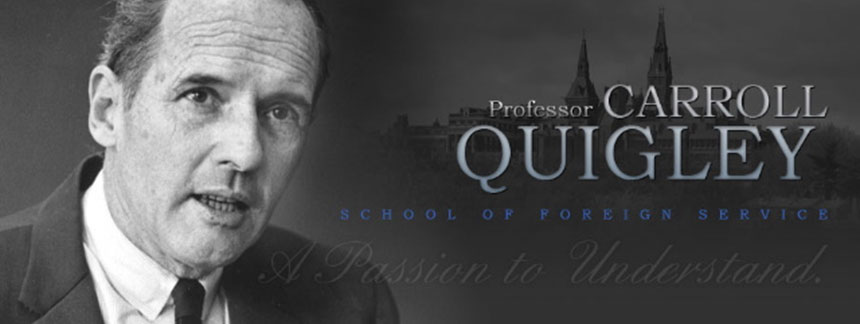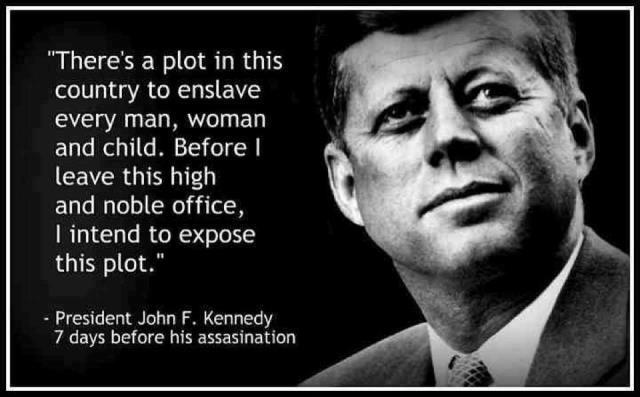The Anglo-American Establishment
By Carroll Quigley (RIP)
Professor of Foreign Service
Georgetown University
New York: Books in Focus
1981
Table of Contents
Chapter 1—Introduction
Chapter 2—The Cecil Bloc
Chapter 3—The Secret Society of Cecil Rhodes (1)
Chapter 4—Milner’s Kindergarten, 1897-1910
Chapter 5—Milner Group, Rhodes, and Oxford, 1901-1925
Chapter 6—The Times
Chapter 7—The Round Table
Chapter 8—War and Peace, 1915-1920
Chapter 9—Creation of the Commonwealth
Chapter 10—The Royal Institute of International Affairs
Chapter 11—India, 1911-1945
Chapter 12—Foreign Policy, 1919-1940
Chapter 13—The Second World War, 1939-1945
Appendix—A Tentative Roster of the Milner Group
Chapter 1—Introduction
One wintry afternoon in February 1891, three men were engaged in earnest
conversation in London. From that conversation were to flow consequences of the
greatest importance to the British Empire and to the world as a whole. For these men
were organizing a secret society that was, for more than fifty years, to be one of the most
important forces in the formulation and execution of British imperial and foreign policy.
The three men who were thus engaged were already well known in England. The
leader was Cecil Rhodes, fabulously wealthy empire-builder and the most important
person in South Africa. The second was William T. Stead, the most famous, and probably also the most sensational, journalist of the day.
The third was Reginald Baliol Brett, later known as Lord Esher, friend and confidant of
Queen Victoria, and later to be the most influential adviser of King Edward VII and King George V.
The details of this important conversation will be examined later. At present we need
only point out that the three drew up a plan of organization for their secret society and a
list of original members. The plan of organization provided for an inner circle, to be
known as “The Society of the Elect,” and an outer circle, to be known as “The
Association of Helpers.” Within The Society of the Elect, the real power was to be
exercised by the leader, and a “Junta of Three.”
The leader was to be Rhodes, and the Junta was to be Stead, Brett, and Alfred Milner.
In accordance with this decision, Milner was added to the society by Stead shortly after the
meeting we have described.(1)
The creation of this secret society was not a matter of a moment. As we shall see,
Rhodes had been planning for this event for more than seventeen years. Stead had been
introduced to the plan on 4 April 1889, and Brett had been told of it on 3 February 1890.
Nor was the society thus founded an ephemeral thing, for, in modified form, it exists to
this day. From 1891 to 1902, it was known to only a score of persons. During this period,
Rhodes was leader, and Stead was the most influential member. From 1902 to 1925,
Milner was leader, while Philip Kerr (Lord Lothian) and Lionel Curtis were probably
the most important members. From 1925 to 1940, Kerr was leader, and since his death in
1940 this role has probably been played by Robert Henry Brand (now Lord Brand).
During this period of almost sixty years, this society has been called by various
names.
-
During the first decade or so it was called “the secret society of Cecil Rhodes” or
“the dream of Cecil Rhodes.”
-
In the second and third decades of its existence it was known as “Milner’s Kindergarten” (1901-1910) and as “the Round Table Group” (1910-1920).
-
Since 1920 it has been called by various names, depending on which phase of its
activities was being examined. It has been called ” The Times crowd,” “the Rhodes
crowd,” the “Chatham House crowd,” the “All Souls group,” and the “Cliveden set.”
.
All of these terms were more or less inadequate, because they focused attention on only
part of the society or on only one of its activities. The Milner Kindergarten and the Round
Table Group, for example, were two different names for The Association of Helpers and
were thus only part of the society, since the real center of the organization, The Society
of the Elect, continued to exist and recruited new members from the outer
circle as seemed necessary. Since 1920, this Group has been increasingly dominated by
the associates of Viscount Astor. In the 1930s, the misnamed “Cliveden set” was close to
the center of the society, but it would be entirely unfair to believe that the connotations of
superficiality and conspiracy popularly associated with the expression “Cliveden set” are a
just description of the Milner Group as a whole. In fact, Viscount Astor was, relatively
speaking, a late addition to the society, and the society should rather be pictured as
utilizing the Astor money to further their own ideals rather than as being used for any
purpose by the master of Cliveden.
Even the expression “Rhodes secret society,” which would be perfectly accurate in
reference to the period 1891-1899, would hardly be accurate for the period after 1899.
The organization was so modified and so expanded by Milner after the eclipse of Stead in
1899, and especially after the death of Rhodes in 1902, that it took on quite a different
organization and character, although it continued to pursue the same goals. To avoid this
difficulty, we shall generally call the organization the”Rhodes secret society”
before 1901 and “the Milner Group” after this date, but it must be understood
that both terms refer to the same organization. This organization has been able to
conceal its existence quite successfully, and many of its most influential members,
satisfied to possess the reality rather than the appearance of power, are unknown even to
close students of British history. This is the more surprising when we learn that one of the
chief methods by which this Group works has been through propaganda.
“Rhodes secret society” – “the Milner Group”:
-
It plotted the Jameson Raid of 1895;
-
it caused the Boer War of 1899-1902;
-
it set up and controls the Rhodes Trust;
-
it created the Union of South Africa in 1906-1910;
-
it established the South African periodical The State in 1908; it founded the British Empire periodical The Round Table in 1910, and this remains the mouthpiece of the Group;
-
it has been the most powerful single influence in All Souls, Balliol, and New Colleges at Oxford for more than a generation;
-
it has controlled The Times for more than fifty years, with the exception of the three years 1919-1922, it publicized the idea of and the name “British Commonwealth of Nations” in the period 1908-1918, it was the chief influence in Lloyd George’s war administration in 1917-1919 and dominated the British delegation to the Peace Conference of 1919; it had a great deal to do with the formation and management of the League of Nations and of the system of mandates;
-
it founded the Royal Institute of International Affairs in 1919 and still controls it;
-
it was one of the chief influences on British policy toward Ireland, Palestine, and India in the period 1917-1945;
-
it was a very important influence on the policy of appeasement of Germany during the years 1920-1940;
-
and it controlled and still controls, to a very considerable extent, the sources and the writing of the history of British Imperial and foreign policy since the Boer War.
It would be expected that a Group which could number among its achievements such
accomplishments as these would be a familiar subject for discussion among students of
history and public affairs. In this case, the expectation is not realized, partly because of
the deliberate policy of secrecy which this Group has adopted, partly because the
Group itself is not closely integrated but rather appears as a series of overlapping circles or
rings partly concealed by being hidden behind formally organized groups of no obvious
political significance.
Book continued: http://www.papelesdesociedad.info/IMG/pdf/quigley.pdf
.
From Tragedy and Hope
“The hope for the twentieth century rests on recognition that war and depression are man-made, and needless. They can be avoided in the future by turning from the nineteenth-century characteristics just mentioned (materialism, selfishness, false values, hypocrisy, and secret vices) and going back to other characteristics that our Western Society has always regarded as virtues: generosity, compassion, cooperation, rationality, and foresight, and finding a increased role in human life for love, spirituality, charity, and self discipline.”
Carroll Quigley. Tragedy and Hope. 1st ed. 1966. p. 1310-1311
http://www.carrollquigley.net/pdf/Tragedy_and_Hope.pdf
.
About The Public Administration of the Napoleonic Kingdom of Italy
“My doctoral dissertation on The Public Administration of the Napoleonic Kingdom of Italy was never published because over-specialized experts who read the version revised for publication persisted in rejecting the aspects of the book in which they were not specialists. The only man who read it and had the slightest idea what it was all about was Salvemini, the great historian from the University of Florence, who was a refugee in this country at the time.
The book’s message could be understood only by an historian who knew the history of Italy, France, and Austria, and was equally familiar with events before the French Revolution and afterwards. But these national and chronological boundaries are exactly the ones recent historians hesitate to cross…”
Carroll Quigley. The Oscar Iden Lectures. 1976.
http://www.carrollquigley.net/pdf/Public_Administration_Napoleonic_Kingdom_Italy-Carroll_Quigley.pdf
.
“There does exist, and has existed for a generation, an international Anglophile network which operates, to some extent, in the way the Radical right believes the Communists act. In fact, this network, which we may identify as the Round Table Groups, has no aversion to cooperating with the Communists, or any other group, and frequently does so. I know of the operation of this network because I have studied it for twenty years and was permitted for two years, in the early 1960s, to examine its papers and secret records.”
According to Quigley, the leaders of this group were Cecil Rhodes and Alfred Milner from 1891 until Rhodes’ death in 1902, Milner alone until his own death in 1925, Lionel Curtis from 1925 to 1955, Robert H. (Baron) Brand from 1955 to 1963, and Adam D. Marris from 1963 until the time Quigley wrote his book. This organization also functioned through certain loosely affiliated “front groups”, including the Royal Institute of International Affairs, the Institute of Pacific Relations, and the Council on Foreign Relations.[23]:132, 950–952
In addition, other secret societies are briefly discussed in Tragedy and Hope, including a consortium of the leaders of the central banks of several countries, who formed the Bank for International Settlements.[23]:323–324
http://en.wikipedia.org/wiki/Carroll_Quigley
.
“In his freshman year in the School of Foreign Service at Georgetown, future U.S. President Bill Clinton took Quigley’s course, receiving a ‘B’ as his final grade in both semesters (an excellent grade in a course where nearly half the students received D or lower).[2]:94, 96
Clinton named Quigley as an important influence on his aspirations and political philosophy in 1991, when launching his presidential campaign in a speech at Georgetown.[2]:96 He also mentioned Quigley again during his acceptance speech to the 1992 Democratic National Convention, as follows:
http://en.wikipedia.org/wiki/Carroll_Quigley


